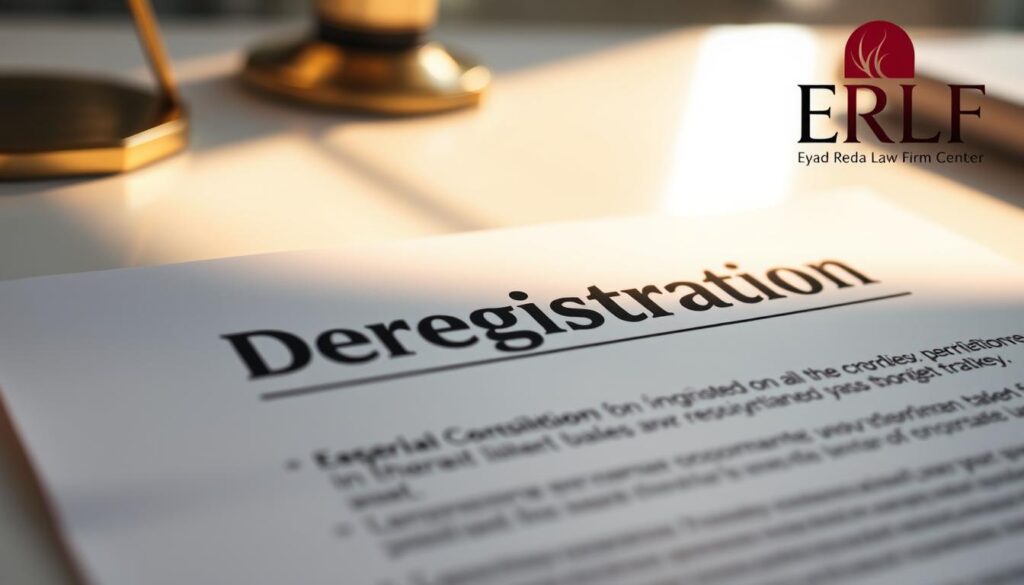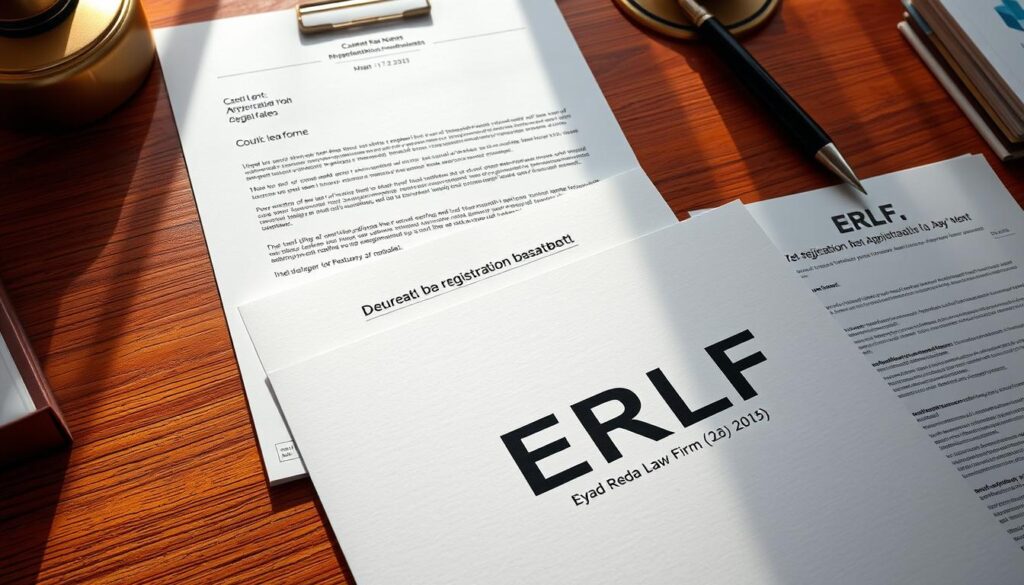Deregistering branch records is key for any company ending its Saudi Arabia operations. The process might seem tough, but it’s vital to follow it well to meet local rules. I’ll show you how to deregister your branch records, covering the rules and legal needs.
Key Takeaways
- Deregistration is crucial for formal closure of branch operations.
- Understanding the legal framework helps avoid complications.
- Compliance with ZATCA regulations is essential.
- Tax implications need to be addressed during deregistration.
- Proper documentation is required for a smooth process.
Understanding the Deregistration Process
Deregistration is key for businesses in Saudi Arabia that are closing down. The deregistration definition means taking a business off official records. Knowing the meaning of deregistration helps businesses follow rules and avoid problems.
What Does Deregistration Mean?
Deregistration is when a branch stops working and is removed from government records. It’s important to avoid extra costs and legal issues after closing.
Why is Deregistration Necessary?
The importance of deregistration is huge. It protects business owners from legal and tax troubles. If a branch is still listed but not active, it can cause big problems with the Saudi government and ZATCA.
Common Scenarios for Deregistration
There are many reasons for deregistration, all part of branch closure scenarios. Some common reasons include:
- Winding up of business operations
- Changes in the ownership structure
- Mergers with other entities
- Relocation to a different jurisdiction
Each branch deregistration circumstance needs a clear understanding and planning. This way, business owners can handle deregistration smoothly.

Steps to Initiate Deregistration
Getting ready for branch deregistration is key. You need to collect important documents, follow local rules, and apply correctly. It might look hard, but the right steps make it easier.
Required Documentation
First, gather all needed documents for deregistration. You’ll need:
- Commercial registration copy
- Board resolution for dissolution
- Power of Attorney
- Any additional legal documents as mandated by the authorities
These documents are very important. Make sure they are correct to avoid delays.
Submitting the Application
After you have all the forms, you can submit the deregistration application. You do this through the ZATCA portal. Upload your documents and explain why you want to deregister. Knowing how to do this right makes the process smoother.
Fees and Charges Involved
In Saudi Arabia, there are no fees for deregistering a branch. This makes closing a branch affordable. Companies will find this helpful when deciding to close a branch.

| Document | Description |
|---|---|
| Commercial Registration Copy | Official proof of the business’s registration. |
| Board Resolution | Document affirming the decision to dissolve the branch. |
| Power of Attorney | Legal authorization delegating signing authority. |
| Other Legal Documents | Any additional papers required by local authorities. |
Handling Company Assets and Liabilities
Before deregistering a company, managing money and assets is key. Paying off debts first makes deregistration easier and avoids penalties. This part talks about settling debts and getting rid of assets.
Settling Debts Before Deregistration
It’s important to clear all financial issues before deregistering. This means paying off loans, debts to suppliers, and other financial problems. Doing this protects the company from future legal or financial issues.
Disposing of Remaining Assets
After debts are paid, managing assets is next. Knowing how to get rid of assets is important. Here are some ways:
- Sell assets to get cash back.
- Share assets with shareholders.
- Give to charities.
Choose the best option based on the company’s plan and laws. This helps avoid problems during deregistration and follows Saudi Arabia’s rules.
| Method of Disposal | Description | Benefits |
|---|---|---|
| Sell Assets | Turn company assets into cash through sales. | Provides immediate liquidity. |
| Distribute Assets | Share remaining assets among shareholders. | Equitable treatment of stakeholders. |
| Donate Assets | Give remaining assets to charitable organizations. | Positive social impact and potential tax benefits. |
Key Regulations Governing Deregistration
It’s important to know the deregistration rules well. These rules help us follow local laws when closing a branch. The Ministry of Commerce and ZATCA set these rules. Knowing them helps us avoid legal problems during the transition.
Relevant Laws and Guidelines
Several laws affect the deregistration process. Key points include:
- Following the Ministry of Commerce’s rules.
- Knowing ZATCA’s tax rules during deregistration.
- Understanding the documents needed to start the process.
These rules show why following deregistration laws is crucial. It ensures the closure is done right.
Importance of Compliance
Following legal rules for closing a branch is very important. It keeps the company’s legal status and avoids penalties. Not following these rules can cause:
- Longer dissolution processes and more financial problems.
- Limitations on future business because of legal issues.
Knowing the importance of compliance helps us deal with deregistration better. It prepares us for a smoother transition.
Timeline for the Deregistration Process
Knowing the deregistration timeline helps manage expectations. The process varies based on several factors. How long deregistration takes depends on the situation’s complexity and the completeness of documents.
Average Timeframes
The branch closure time can range from weeks to months. This depends on things like outstanding debts and rules. Being prepared can help avoid long delays.
Factors Influencing Duration
- Outstanding Liabilities: Unpaid debts can make deregistration take longer.
- Completeness of Documentation: Missing papers cause big delays.
- Regulatory Approvals: Getting approvals quickly affects the time needed.
Being organized and proactive is key. It helps make the deregistration process smoother.
Potential Challenges in Deregistration
Deregistration can face several challenges. These include unresolved debts, not meeting rules, and selling assets. These problems often happen when closing a branch. Knowing these challenges is key to a smooth deregistration.
Common Issues Encountered
- Unresolved debts leading to compliance issues
- Inadequate documentation resulting in regulatory non-compliance
- Problems in liquidating or transferring assets
- Inconsistencies in tax obligations that complicate the process
Solutions to Overcome Challenges
To deal with deregistration challenges, taking proactive steps helps. Getting professional help is often a good idea. Experts can assist in many ways, such as:
- Assessing and settling financial obligations to clear unresolved debts.
- Ensuring all required documentation is prepared and submitted in accordance with regulatory guidelines.
- Advising on asset disposal strategies to minimize loss.
- Confirming tax obligations to avoid unexpected penalties during branch closure.
Importance of Professional Assistance
Starting the deregistration process can be tough. It involves local rules and paying off debts. Getting help from experts is key for a smooth process. It’s clear when you need a consultant, especially with complex issues.
When to Seek Help
I think getting expert help for branch deregistration is smart from the start. This is especially true if you have financial or legal issues. A consultant can help avoid problems and make the process easier.
Benefits of Hiring a Consultant
Hiring a deregistration consultant has many benefits:
- They know the local laws well.
- They make paperwork and applications easier.
- They help solve problems quickly.
- They handle talks with government officials.
These benefits show how helpful professional help is. It makes closing down your branch easier and follows the rules. Experts let you focus on business, while they handle the hard stuff.
Post-Deregistration Obligations
Deregistration doesn’t mean a company is done with its duties. It’s important to keep records and follow rules after deregistration. Keeping documents for a while shows a company’s commitment to being open.
Record Keeping Responsibilities
Companies must keep detailed records after deregistration. This includes financial statements and tax filings. Keeping these records for years helps with audits and shows the company is following the law.
Notifications to Stakeholders
It’s key to tell everyone about deregistration. This includes telling employees, suppliers, and customers. Clear messages help keep good relationships and avoid confusion.
Impact of Deregistration on Taxation
Deregistering a business branch in Saudi Arabia changes how taxes work. It’s important to know the tax rules for closing down. You must understand the tax effects of deregistration to avoid fines.
Knowing what taxes you owe helps you pay them before deregistering. This way, you can avoid problems later.
Understanding Tax Implications
When you close a business, you face many tax issues. You need to check with the General Authority of Zakat and Tax (ZATCA) about any taxes you still owe. It’s key to finish all tax tasks to avoid future problems.
I always check the tax rules for deregistration carefully. Missing these can cause big financial issues.
Steps to Finalize Tax Obligations
To deregister without trouble, you must finish your taxes first. Here’s what to do:
- File all tax returns and pay any taxes you owe.
- Get a tax clearance certificate from ZATCA to show you’ve paid all taxes.
- Check your past taxes and fix any mistakes before you close.
By following these steps, you can finish your taxes right. This makes deregistration go smoothly without any last-minute problems.
Conclusion: Navigating Deregistration Successfully
Looking back, I see that being detailed and ready is key for a smooth deregistration in Saudi Arabia. These steps help companies deal with closing branches. They make sure all legal steps are followed.
Knowing important details about closing branches helps reduce stress. It makes the process clearer.
For deregistration, keeping records right and knowing the rules is crucial. I always look for professional help when needed. This makes me feel more confident in the process.
Planning well is important for deregistration. Using tips like organizing papers and talking to people can help a lot. Following these steps helps avoid problems and prepares for new projects.
